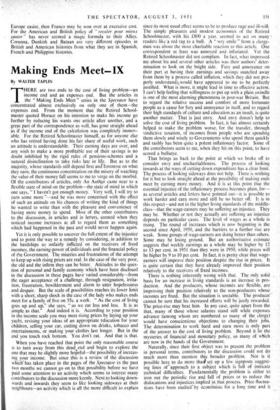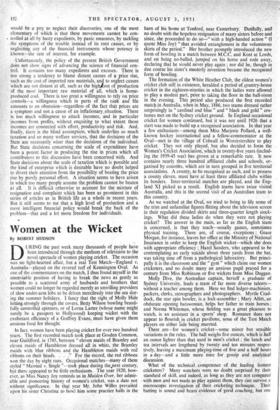Making Ends Meet IX
By WALTER TAPLIN THERE are two ends to the cost of living problem—an income end and an expenses end. But the articles in the " Making Ends Meet " series in the Spectator have concentrated almost exclusively on only one of them—the expenses end. From the moment that the Retired School- master quoted Horace on his intention to make his income go further by reducing his wants one article after another, and a great part of the correspondence as well, has gone straight ahead as if the income end of the calculation was completely immov- able. For the Retired Schoolmaster himself, as for anyone else who has retired having done his fair share of useful work, such an attitude is understandable. Their earning days are over, and any wish to make a more profitable use of their savings is no doubt inhibited by the rigid rules of pensions-schemes and a natural_disinclination to take risks late in life. But as to the majority, whose standards still depend first and'foremost on what they earn, the continuous concentration on the misery of watching the value of their money fall seems to me to verge on the morbid. Of the contributors of articles, only An Authpr came near to a flexible state of mind on the problem—the state of mind in which one says, " I haven't got enough money. Very well, I will try to earn some more "—and he was more concerned with the effect of such an attitude on his chances of writing the kind of things he wanted to write than with the pleasure and convenience of having more money to spend. Most of the other contributors to the discussion, in articles and in letters, seemed when they noticed income increases at all to regard them as something which had happened in the past and would never happen again.
Yet it is only possible to uncover the full extent of the injustice and to point the wayto a remedy by considering, in addition to the hardships so unfairly inflicted on the receivers of fixed incomes, the earning-power of individuals and the financial policy of the Government. The miseries and frustrations of the attempt to keep up with rising prices are real. In the case of the very poor, the old and the infirm they can be bitter. Attitudes to the ques- tion of personal and family economy which have been disclosed in the discussion in these pages have varied considerably—from the eager acceptance of a challenge, through resignation, irrita- tion, frustration, bewilderment and alarm to utter hopelessness and despair. But the scale of possibilities reaches its lower limit with a short, sharp shock in the case of the lady who makes ends meet for a family of five on 55s. a week. " As the cost of living goes up and up," she says, " so we eat less and less. It is as simple as that." And indeed it is. According to your position in the income scale you may meet rising prices by laying up your yacht, revising your ideas of an appropriate education for your children, selling your car, cutting down on drinks, tobacco and entertainments, or making 'your clothes last longer. But in the end you touch rock bottom. You don't eat. And that is that.
• When you have reached that point the only reasonable course is to turn away from this dead end and begin to explore the one that may be slightly more hopeful—the possibility, of increas- ing your income. But since this is a review of the discussion which' has taken place in the pages of the Spectator in the past two months we cannot go on to that possibility before we have paid some attention to an activity which seems to interest many contributors to the discussion more keenly. Next to looking down- wards and inwards they seem to like looking sideways at their neighbours—an activity which is all the more difficult to explain since its most usual effect seems to be to produce rage and The simple pleasures and modest economies of the Retired Schoolmaster, with his £800 a year, seemed to act on many • readers like a red rag to a bull. A " wry smile " from a clergy- man was about the most charitable reaction to this article. One correspondent at least was annoyed and infuriated. Yet the Retired Schoolmaster did not complain. In fact, what impressed me about his and several other articles was their authors' deter- mination to look on the bright side. Fury and annoyance on their part at having their earnings and savings snatched away from them by a process called inflation, which they did not pro- perly understandN would have appeared to me to be perfectly justified. What is more, it might lead in time to effective action. I can't help feeling that willingness to put up with a plain swindle is one of the most alarming phenomena in post-war Britain. But to regard the relative success and comfort of more fortunate people as a cause for fury and annoyance in itself, and to regard their high standa1ds of culture and education as an insult, is quite another matter. That is just envy. And envy doesn't help to solve the cost of living problem. In fact, it has almost certainly helped to make the problem worse, for the transfer, through vindictive taxation, of incomes from people who are spending them slowly and wisely to Governments who spend them quickly and rashly has been quite a potent inflationary factor. Some of the contributors seem to me, when they hit on this point, to have scored a bullseye.
That brings us back to the point at which we broke off to consider envy and uncharitableness. The process of looking inwards at the ways of cutting down expenditure has a clear limit. The process of looking sideways does not help. There is nothing for it but to look straight ahead at the possibility of making ends meet by earning more money. And it is at this point that the essential injustice of the inflationary process becomes plain, for— as several articles and letters have pointed out—it is possible to work harder and earn more and still be no better off. It is in this respect—and not in the higher living standards of the middle- class—that the wage-earners may be suffering an injustice. They may be. Whether or not they actually are suffering an injustice . depends on particular cases. The level of wages as a whole is rising. The round of increases which is now beginning is the second since April, 1950, and the barriers to a further rise are weak. Some groups of wage-earners are doing better than others. Some may be losing ground. But an authoritative estimate suggests thaf weekly earnings as a whole may be higher by 12 to 13 per cent. in 1951 than they were in 1950, while prices will be higher by 9 to 10 per cent. In fact, it is pretty clear that wage- earners will improve their position despite the rise in prices. It is quite certain that they have already improved their position relatively to. the receivers of fixed incomes. There is nothing inherently wrong with that. The only-solid . basis for an increase in living standards is an increase in pro- duction. And the producers, whose incomes are flexible, are improving their position relatively to the non-producers whose . incomes are fixed. But the situation is unstable. The producer`' cannot be sure that his increased efforts will be justly rewarded. The price-rise may beat him. In any case, quite apart from the that, many of those whose salaries stand still while expenses advance (among whom are numbered so many of the clergy) would have conscientious objections to changing their jobs. The determination to work hard and earn more is only part of the answer to the cost of living problem. Beyond it lie the mysteries of financial and monetary policy, so many of which are now in the hands of the Government.
Naturally, since their first object was to present the problem in personal terms, contributors to the discussion could not do much more than mention this broader problem. Nor is it possible here to do more thari set up a few signposts suggest- ing lines of 'approach to a subject which is full of intricate technical difficulties. Fundamentally the problem is either to iron out the periodic rise and fall of prices or to reduce the dislocations and injustices implied in that process. Price fluctua- tions have been studied' by economists for a long time and it would be .a pity to neglect their discoveries, one of the most elementary of which is that these movements cannot be con- trolled at all by hasty expedients, by panic measures, by tackling _ the symptoms of the trouble instead of its root causes, or by neglecting any of the financial instruments whose potency is kfiown—the rate of interest, for example.
Unfortunately, the policy of the present British Government does not show signs of advancing the science of financial con- trol. It contains too many expedients and excuses. There is too strong a tendency to blame distant causes of a price rise, such as the cost of imported raw materials, and to neglect causes which are not distant at all, such as the hightost of production of the, most important raw material of all, which is home- produced coal. There is too great a willingness to rely on price controls—a willingness which in parts of the rank and file amounts to an obsession—regardless of the fact that prices are a symptom and not a cause of an inflationary,situation. There is too much willingness to attack incomes, and in particular incomes from profits, without enquiring to -what extent those incomes are connected with effort, productivity and risk. And, finally, there is the blind assumption, which underlies so much taxation and so many welfare services, that- the decisions of the State are necessarily wiser than the decisions of the individual. But State decisions concerning the scale of expenditure have been a potent factor in producing the rise in prices which -all contributors to this discussion have been concerned with. And State decisions about the scale of taxation which is possible and the kind of enterprise which is desirable have no doubt helped to divert their attention from the possibility of beating the price rise by purely personal effort. A situation seems to have arisen in which too many people assume the.problem cannot be beaten at all. It is difficult otherwise to account for the mixture of resignation and complaint which has been as prominent in this series of articles as in British life as a whole in -recent years. But it still seems to me that a high level of production and a more intelligent financial policy would break the back of the problem—that and a lot more freedom for individuals.































 Previous page
Previous page